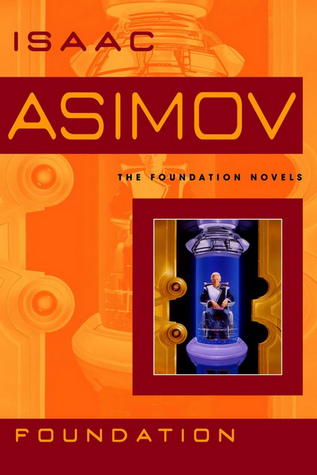 I don't think it would be a stretch to say that anyone who has ever read at least a little science fiction is familiar with Isaac Asimov's Foundation Trilogy. This superbly original work, first published in 1951, tells the tale of a future Galactic Empire, its fall and
its gradual reconstruction over the span of some centuries. Star Wars, Star Trek, and all the other diluted spin-offs owe a huge debt to Asimov and to many of his contemporary Sci-Fi authors.
I don't think it would be a stretch to say that anyone who has ever read at least a little science fiction is familiar with Isaac Asimov's Foundation Trilogy. This superbly original work, first published in 1951, tells the tale of a future Galactic Empire, its fall and
its gradual reconstruction over the span of some centuries. Star Wars, Star Trek, and all the other diluted spin-offs owe a huge debt to Asimov and to many of his contemporary Sci-Fi authors.The foundation series won the one-time Hugo Award for "Best All-Time Series" in 1966. Asimov began adding to the series in 1981, with two sequels: Foundation's Edge, Foundation and Earth, and two prequels: Prelude to Foundation, Forward the Foundation. The additions made reference to events in Asimov's Robot and Empire series, indicating that they were also set in the same fictional universe.
The premise of the series is that the mathematician Hari Seldon spent his life developing a branch of mathematics known as psychohistory, a concept of mathematical sociology. Called forth to stand trial on Trantor for allegations of treason (for foreshadowing the decline of the Galactic Empire), Seldon explains that his science of psychohistory foresees many alternatives, all of which result in the Galactic Empire eventually falling. If humanity follows its current path, the Empire will fall and 30 thousand years of turmoil will overcome humanity before a second Empire arises. However, an alternative path allows for the intervening Middle-Age period to last only 1000 years, if Seldon is allowed to collect the most intelligent minds and create a compendium of all human knowledge, entitled Encyclopedia Galactica.
If the plot sounds vaguely familiar, it is only because Asimov based the concept for this book on "Decline and fall of the Roman Empire", by Gibbon, and the "period of turmoil and little progress" between Empires represents the Middle Ages, as perceived by Asimov in his fictional history of the future.
Asimov's writing is unique in that it doesn't focus much on people, characterization or - even less - visualization. He was not a visual author at all. His heart is in the logic that propels the plot forward. His style can be considered vaguely similar to Arthur Conan Doyle or Agatha Christie. It makes me laugh how, despite this story is set 14,000 years in the future, everybody, on every planet, keeps smoking cigars and cigarettes as if their life depended on it. Also, when they want to gaze at the stars, the characters pull "heavy drapes from the windows". It's stunning. Asimov clearly doesn't give a crap about these details, what he's writing about is big ideas and logical tricks, not people, not emotions, not a credible future reality.
Plus, let's keep in mind: what Science Fiction is really about, always, is the present, not the future.
Personally, I love this series, but I prefer Asimov's robot series, I find it more engaging. The weakness of the Foundation series lays in the ultimate goal of decreasing the "Middle Ages" turmoil period from 30,000 years to 1,000 years. If you think about it for a second, it just doesn't make too much sense, and it does not help the reader to invest in the story, especially when the characters necessarily change with each of the 5 stories included in this book.
In conclusion: this is a masterwork.No doubt. Big ideas thinking on steroids, from one of the 3 great masters of Science Fiction. Still, some might find Asimov's writing to be too dry. This book will appeal much more to left-brainers than right-brainers.
No comments:
Post a Comment